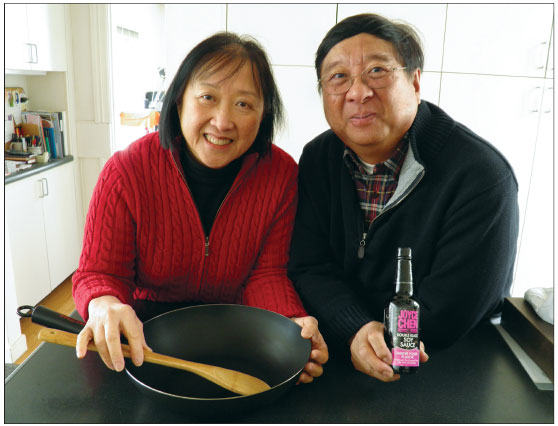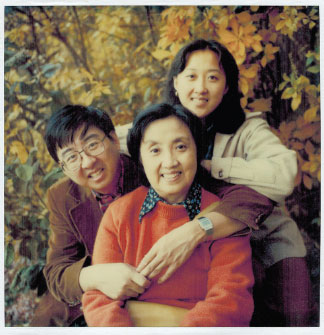Carrying on a Chinese food legacy
Updated: 2015-04-17 11:41
By Niu Yue in New York(China Daily USA)
|
||||||||
Chinese food has been available in the United States since the mid-1800s, when the first Chinese came to the country as laborers. But authentic Chinese food did not start to prosper in America until the mid-20th century, and that was largely because of one woman: Joyce Chen.
Born in Beijing in 1917, Chen went to Cambridge, Massachusetts in 1949 at the end of the Chinese civil war. Since her youth, she had shown an interest in cooking. Her dishes were a hit among Chinese students at Harvard and MIT at a time when authentic Chinese cuisine was not easy to find.
"The first Chinese restaurants were not opened by professionally trained chefs, but by immigrants who were denied work elsewhere or simply wished to feed their own communities," according to the Asian Pacific American Center of the Smithsonian Institution website.
"Cooking was just a way to eat, and it was very hard to find certain ingredients," said Stephen Chen, Joyce Chen's second son. "Where would you get a bean sprout? When I was very young, the only place I could find bean sprouts was in a can in a supermarket. And as you can imagine, those were probably very horrendous."
After World War II, things began to change. The timing was right for Joyce Chen as well, as more Chinese immigrants after the war came from more diverse areas and were looking for food they were used to.
International shipping and aviation became more convenient after the World War II, which allowed Americans to travel more and experience authentic Chinese food, instead of the highly "Americanized" version.
"(Chinese restaurants) cooked dishes that might be pleasing to Americans," said Helen Chen, Stephen's older sister. "They used vegetables that we even don't use in China." Most Chinese restaurants also provided one menu for Chinese and another for Americans.
Fresher and better quality ingredients also became more available in the US and Joyce Chen began serving up authentic Chinese cuisine in the United States.
She opened her first Joyce Chen restaurant in Cambridge in 1958.
"When people came to [Chinese] restaurants, they just wanted chow mien and chop suey, because that's all they knew," said Helen.
So Joyce Chen pioneered Chinese buffet. She would put authentic Chinese dishes next to roast turkey, beef, salad and other American dishes which were seldom cooked in China. People could sample authentic Chinese food, while still eating what they were used to.
Soon, more and more authentic Chinese dishes were served and American ones started to disappear. People started to wait in line.
"My mother learned to cook in China," said Helen. "In those days, people who came to this country were either very, very poor or upper-middle class, and they had servants. So, they actually didn't know how to cook."
Joyce Chen opened four restaurants all in the Boston area. Her guests have included former Secretary of State Henry Kissinger and actor Danny Kaye, among others. In 1962, she self-published the Joyce Chen Cook Book, selling more than 6,000 copies. When it was published commercially, it sold more than 70,000 copies.
In 1967, she was invited by PBS to start a cooking show Joyce Chen Cooks. The program started with the sound of aeolian bells and the name of the dish in both English and Chinese, and Joyce Chen would greet viewers with Ni Hao, Ni Hao (Hello, How are you?)
Sometimes, she would conclude her 30-minute show with a few cultural tips. For example, it was better not to brag about your cooking skills, because it was considered rude to show off. A total of 26 episodes were produced and broadcast in the US, UK and Australia.
In 1971, she developed her own brand of cookware and in 1982 started selling "Joyce Chen Specialty Foods" bottled sauces.
Joyce Chen died in 1994 after a nine-year battle with Alzheimer's disease, but her legacy lives on.
In September, her fans staged a festival to remember Peking ravioli, a variation on Chinese dumplings introduced by Chen into the United States. She is often compared to Julia Child, who popularized French cooking in the US.
"Julia Child made it OK to experiment with French food. Joyce Chen made it OK to explore other kinds of food," Jamme Chantler, a French Canadian who developed an interest in Chinese food by watching Chen's show, told the Boston Globe.
On September 26, 2014, the United States Postal Service released a series of Limited Edition Celebrity Chefs Forever stamps, with Joyce Chen included. She was endorsed by the USPS as "one of America's most well-known promoters of Chinese food" and someone who "invited newcomers to sample unfamiliar dishes in ways that firmly established Chinese cuisine in the United States."
The mission to continue to popularize Chinese food fell to her children. Joyce Chen Restaurant closed in 1998, partly due to intensifying competition from a surging number of Chinese restaurants, some of them run by people who once worked for Joyce Chen.
The business, Helen said, was also too time consuming. "It is one of those businesses that are 24/7," she said. "You don't really have the family life that people who just work nine to five, Monday through Friday have."
Stephen is now running Joyce Chen Foods, a sauce, condiment and frozen food brand. Through co-packagers, the products are available in stores all over the United States.
"We try to be organic, gluten free, lower in sodium, all natural, all quality," he said. "My mother's name is on it, and I don't want to do anything to embarrass her name."
Helen was initially running Joyce Chen's cookware business, but sold it to a Chicago company in 2003, as more capital was needed to keep the company growing.
"At a certain point, many companies that have been established by families or individuals eventually sell," she said. "You just cannot keep on growing and growing, and just have the family run it. You can stop growing if you want, but the business will eventually fail."
Instead, Helen has written three cook books herself, and she created her own cookware brand, "Helen's Asian Kitchen", which is distributed by Harold Import Company in Lakewood, New Jersey.
Helen has also inherited her mother's idea of making the food business "not just a business, but a cultural exchange center". She is now teaching cooking at Boston University, and also giving classes to children interested in cooking with the help of a non-profit organization.
"I explain about the cuisine, but I also try to put together how the culture, the geography and history of China are really expressed in the food," she said.
She told China Daily that a lot of knowledge was behind food. For example, when Chinese people refer to meat, they usually refer to pork instead of beef. It is partly because of China's geography, with only around ten percent of land arable.
"The land cannot be put aside for grazing animals. We may have a lot of cows in the Mid-west and Argentina, but not in China," said Helen.
When the last of Joyce Chen's restaurants closed, Boston Business Journal said the "last pieces of the Joyce Chen empire fell."
Her eldest son Henry's retail store "Joyce Chen Unlimited" was closed in 2008 one year after his death. But Stephen told China Daily that what he and Helen are doing is "touching more people than having a restaurant".
"In a restaurant, you are limited by how many people can sit down. But now, we sell to supermarkets and cookware stores around the country. And you just gain a big audience," he said.
Both Helen and Stephen are continuing to spread Chinese cuisine and the culture behind it. "It's not just about passing on Joyce Chen, but the spirit of what she was doing, which is the legacy of the Chinese food culture, said Helen. "China is the only living old civilization in the world."
Lu Huiquan in New York contributed to this story.
|
Helen Chen (left) and Stephen Chen appear together with products of Helen's Asian Kitchen and Joyce Chen Foods. Provided to China Daily |
|
Joyce Chen appears in USPS Celebrity Chefs Series. Provided to China Daily |
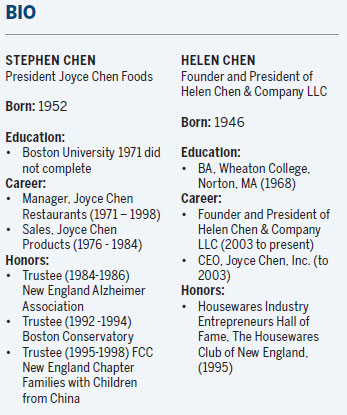
|
Stephen Chen (left), Joyce Chen (center) and Helen Chen appear in a family photo together in the 1970s. Provided to China Daily |

(China Daily USA 04/17/2015 page11)
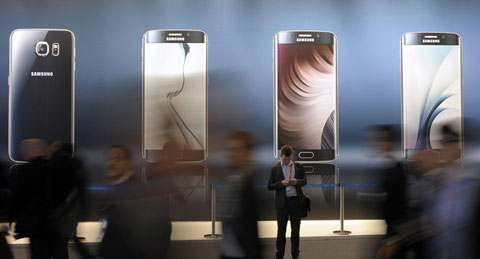
 Top 10 industries with most job-hoppers
Top 10 industries with most job-hoppers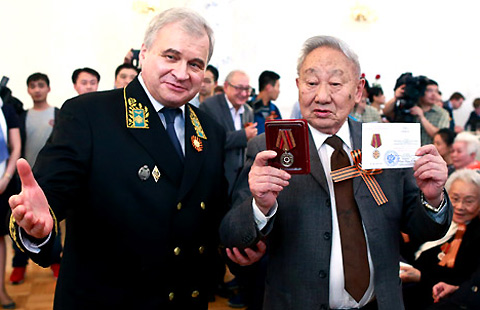
 Russia honors Chinese veterans from WWII
Russia honors Chinese veterans from WWII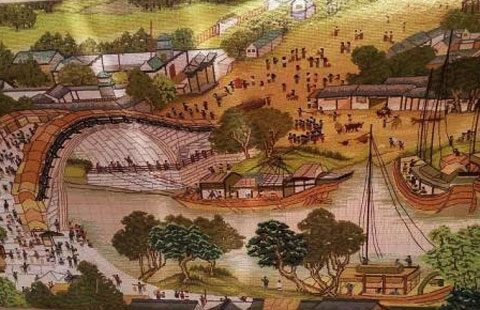
 Woman embroiders giant painting
Woman embroiders giant painting
 HK singer-actress Mok takes fans on global journey
HK singer-actress Mok takes fans on global journey
 Sandstorm engulfs North China
Sandstorm engulfs North China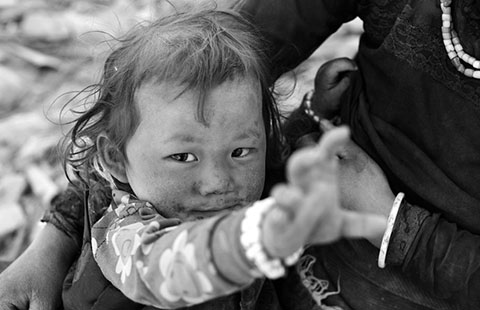
 Qinghai quake: Reliving the memory
Qinghai quake: Reliving the memory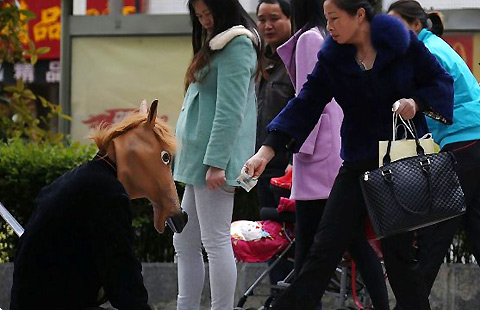
 Father horses around to save his son
Father horses around to save his son
 Ten photos you don't wanna miss - April 15
Ten photos you don't wanna miss - April 15
Most Viewed
Editor's Picks

|

|

|

|

|

|
Today's Top News
US-listed Chinese tech stocks not bubbly: analysts
AIIB praised, US criticized by experts
Japan tops China as top holder of US debt
Q1 economic data: what the economists say
AIIB to operate in 'transparent way'
China-Canada Year kicks off
Paulson: US should have joined AIIB
Economic reforms in China are 'needed'
US Weekly

|

|
